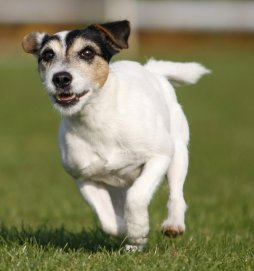Jack Russell Terrier Health Care & Feeding
By Michele Welton, Dog Trainer, Breed Selection Consultant, Author of 15 Dog Books

Start your Jack Russell Terrier off on the right foot by feeding the right food, giving the right vaccinations, finding the right vet, and if you're going to spay or neuter, don't do it too early.
Jump down to this list of
Jack Russell Terrier Health Problems
Or check out my advice for raising a healthy Jack Russell Terrier puppy or adult dog:
 Dog Health Care – The Sensible Way
Dog Health Care – The Sensible Way
Read my advice on daily health care so your Jack Russell lives a long, healthy life and seldom needs to see the vet... [read more]
 3 Best Ways To Feed Your Dog Healthy Food
3 Best Ways To Feed Your Dog Healthy Food
You can dramatically increase your dog's chances of living a long, healthy life by feeding the right food. Cutting right to the chase, the best foods for your Jack Russell Terrier are... [read more]
 A Quick Way To Make Homemade Dog Food
A Quick Way To Make Homemade Dog Food
Your Jack will love real chicken, turkey, beef, fish, eggs, yogurt, broccoli.... this is not just "people food" and I'll tell you why... [read more]
 5 Best Kibble and Canned Dog Foods
5 Best Kibble and Canned Dog Foods
Some are better than others, but I must be honest – I'm not a huge fan of dry or canned dog food. Here are my concerns... [read more]
 Vaccinations and Booster Shots: Needed or Not?
Vaccinations and Booster Shots: Needed or Not?
How many vaccinations does your Jack Russell Terrier puppy really need? Does your adult dog need yearly booster shots? The vaccination guidelines have changed! Find out what some vets aren't telling you... [read more]
 Spaying Your Female Dog: Pros and Cons
Spaying Your Female Dog: Pros and Cons
Should your female Jack Russell Terrier be spayed? Current research says, "The AGE at which you spay can be vitally important to your dog's future health." So what's the best age? [read more]
 Neutering Your Male Dog: Pros and Cons
Neutering Your Male Dog: Pros and Cons
Have you been told that you must neuter your male Jack Russell? Current research shows that the issue is not so simple. Pet owners are not being told about some risks associated with neutering male dogs, especially neutering too early... [read more]
 Make Sure Your Vet is the Best!
Make Sure Your Vet is the Best!
Is your current veterinarian really the best choice for your dog? Here's how to tell... [read more]
 Assisi Loop Review
Assisi Loop Review
Does your Jack suffer from arthritis, hip dysplasia, disk disease, colitis? My honest review of a veterinary device you can use at home to reduce inflammation and pain. [read more]

Complete list of Jack Russell Terrier health problems
Eye diseases
Eye diseases are the main concern in Jack Russells, especially lens luxation (which can lead to secondary glaucoma) and cataracts.
Other eye diseases include eyelash abnormalities, persistent pupillary membranes, and progressive retinal atrophy (PRA).
Sadly, we see a lot of blind Jack Russell Terriers.
Heart diseases
Cardiomyopathy, patent ductus arteriosus, and sub-aortic stenosis are three big heart diseases that occur in Jack Russells.
Neurological/neuromuscular diseases
Epilepsy (seizures of unknown cause) is a serious concern in the breed.
Jack Russell Terriers are vulnerable to cerebellar ataxia, myasthenia gravis, and lysosomal storage disease.
Another neurological syndrome called spinocerebellar ataxia can appear during adolescence, but is not as devastating as cerebellar ataxia.
Mild abnormalities of the brain may also be responsible for the excessive shaking or tremors of the rear legs that sometimes occur in Jack Russells.
Inherited deafness
Many Jack Russell Terriers are born deaf (partially or completely).
Orthopedic diseases
The big four are luxating patella (loose knees), Legg-Calve-Perthes disease, hip dysplasia, and elbow dysplasia. All of these cause pain and lameness and may require expensive surgery.
Unfortunately, many breeders aren't even testing their Jack Russells for orthopedic diseases before breeding them. So we don't know how widespread these problems may be in the breed.
Jack Russell Terriers are supposed to be square in build (length should approximately equal their height at the shoulders).
But there are a lot of Jack Russells with short (dwarfed, bowed) legs and a longish back, which is a deformity called chondrodysplasia. These dogs have an increased risk of malformed joints and intervertebral disk disease.
Miscellaneous health problems
- Allergies (which cause itchy skin and often leading to pyoderma) are very common in all terrier breeds.
- Blood-clotting diseases include von Willebrand's and factor X deficiency.
- Hormonal/endocrine system diseases include hypothyroidism and occasionally diabetes.
- Liver shunt and hernias occur more often in Jack Russells than in many other breeds.
Preventing health problems
Some health problems are inherited. For example, if your dog inherits from his parents the genes for an eye disease called PRA, he will go blind and there's nothing anyone can do about it.
 But most health problems can be prevented by the ways you raise your dog.
But most health problems can be prevented by the ways you raise your dog.
FREE eBOOK! My free online health care program, 11 Things You Must Do Right To Keep Your Dog Healthy and Happy shows you how to raise your Jack Russell Terrier in all the right ways that help prevent health problems. Become your dog's health care champion!
My best-selling books – now available FREE on my website
 Respect Training For Puppies: 30 seconds to a calm, polite, well-behaved puppy is for puppies 2 to 18 months old. Your puppy will learn the 21 skills that all family dogs need to know. Click here to read for free.
Respect Training For Puppies: 30 seconds to a calm, polite, well-behaved puppy is for puppies 2 to 18 months old. Your puppy will learn the 21 skills that all family dogs need to know. Click here to read for free. Teach Your Dog 100 English Words is a unique Vocabulary and Respect Training Program that will teach your adult dog to listen to you and do what you say. Click here to read for free.
Teach Your Dog 100 English Words is a unique Vocabulary and Respect Training Program that will teach your adult dog to listen to you and do what you say. Click here to read for free. 11 Things You Must Do Right To Keep Your Dog Healthy and Happy helps your dog live a longer, healthier life. Get my honest advice about all 11 Things before you bring home your new puppy, because some mistakes with early health care cannot be undone. Click here to read for free.
11 Things You Must Do Right To Keep Your Dog Healthy and Happy helps your dog live a longer, healthier life. Get my honest advice about all 11 Things before you bring home your new puppy, because some mistakes with early health care cannot be undone. Click here to read for free.

